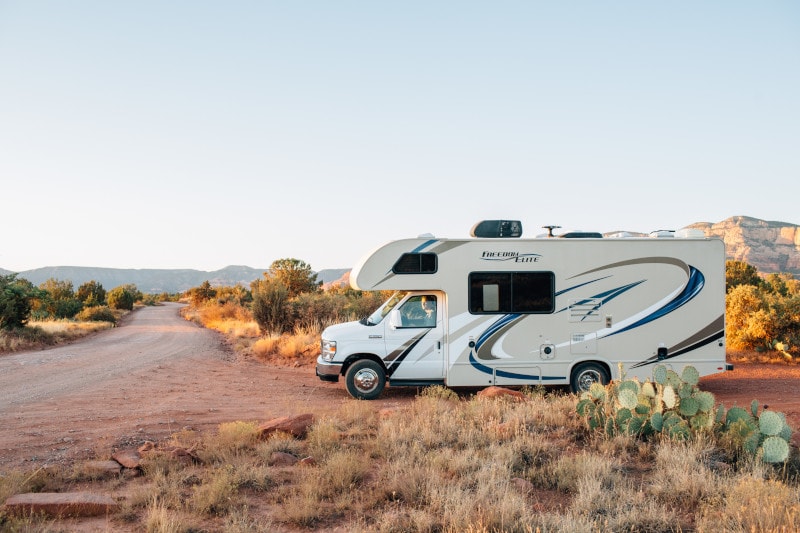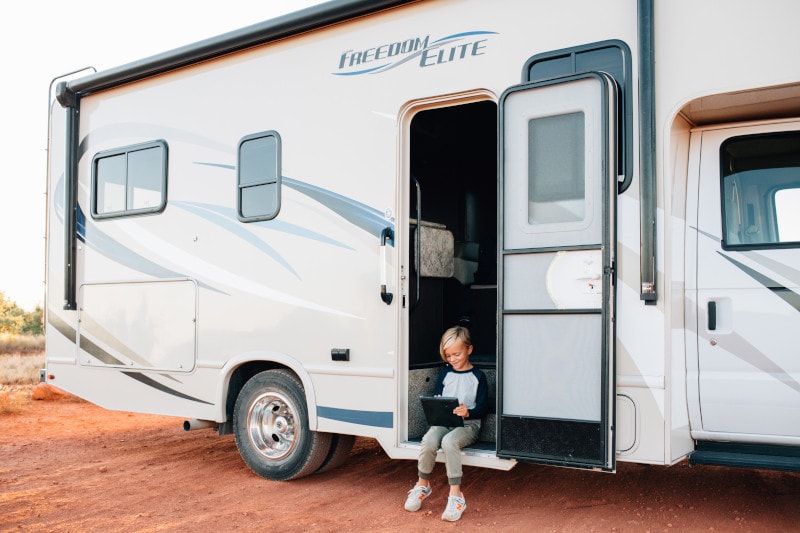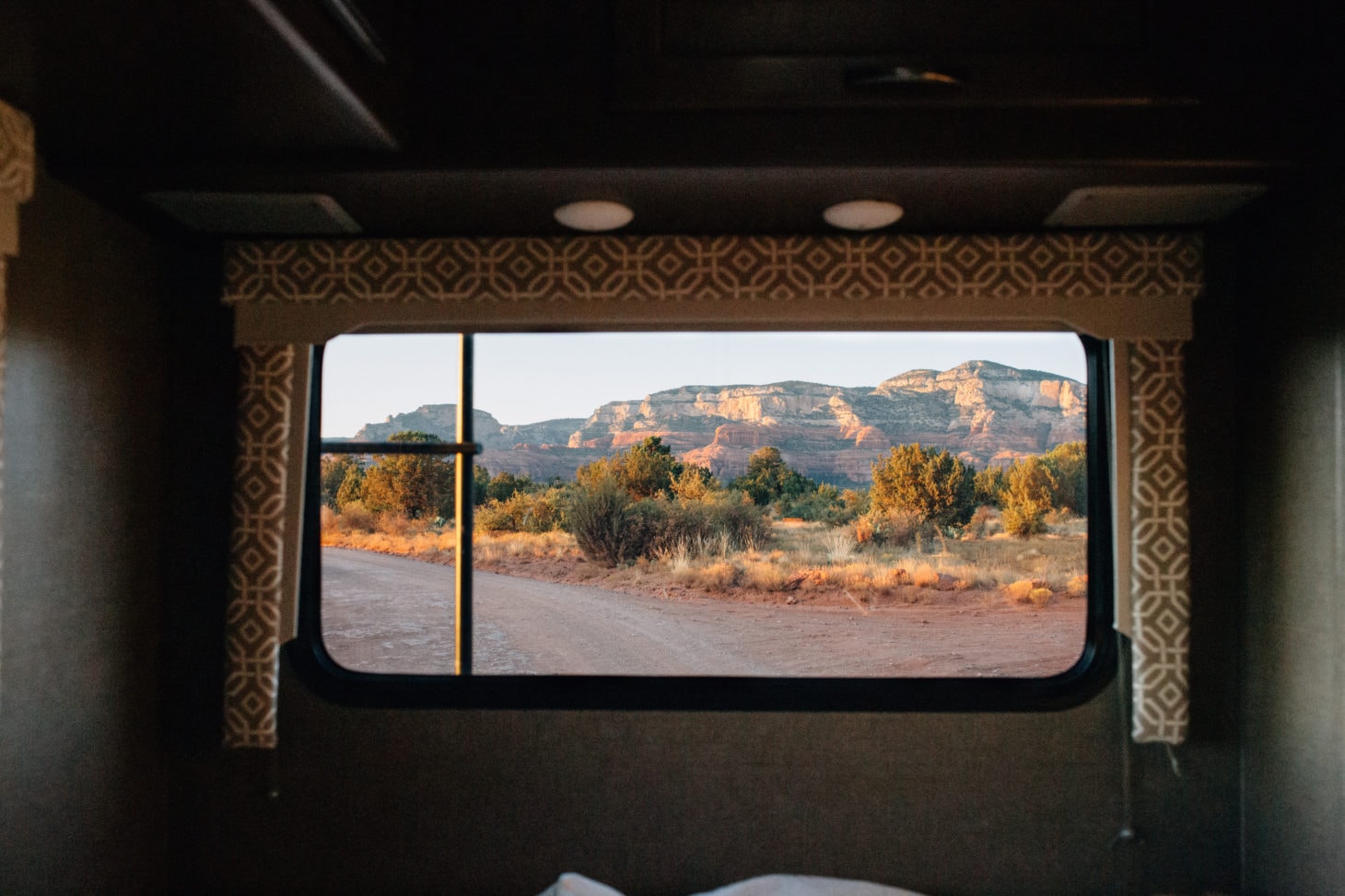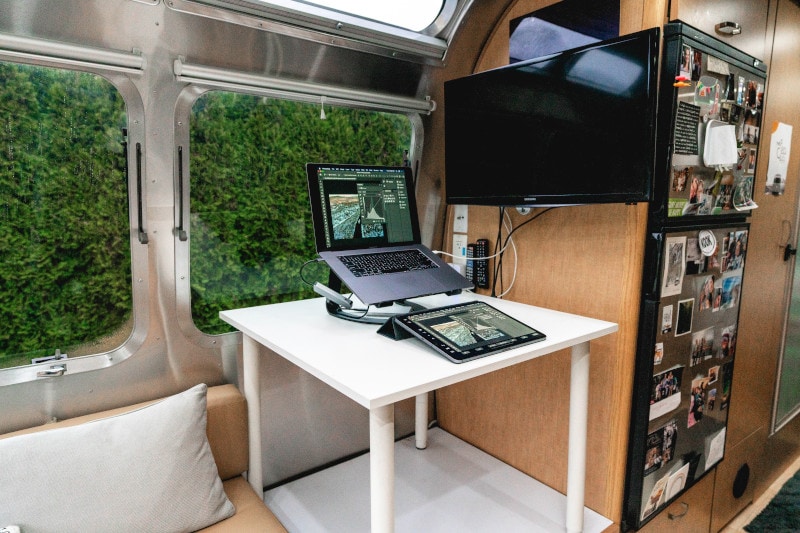Is owning an RV worth it? Maybe this is a question you’ve thought about for a while, having enjoyed camping and feeling ready to take the next step. Or perhaps you’ve only recently started exploring the idea of rolling in a home on wheels.
Of course, the answer will be different for everyone, but it’s important to consider a few different factors when determining if RV ownership is right for you. Here are the top things to take into account when contemplating RV ownership.
The Financial Costs of Owning an RV

The Cost of the Actual RV
You can spend anywhere from $1,000 on a used pop-up camper to $300,000 (or more) on a brand new motorhome. While it may be tempting to splurge on all the bells and whistles, it’s important to consider your family’s specific needs—and what you can realistically afford. Taking on an RV that busts the family budget will not lead to an enjoyable experience, nor will taking out a loan for a brand new RV that you find isn’t right for your family.
My family’s first RV was a 10-year-old Class A in great condition that we paid for in cash. After a couple of years, we decided to trade it in for a new Class A. Although no longer traveling full-time, we were committed to the RV lifestyle, knew what worked for us, and were comfortable taking on the additional expense for an upgraded rig that we love.
Your guide to full-time RV living
Additional Costs
Don’t forget to factor in the cost of insurance, vehicle registration, regular maintenance, plus storage if you’re not able to park the RV at your residence. Other costs that vary but should be budgeted for are campground fees, fuel, unexpected repairs, and gear, which includes anything from kitchen supplies to a high-quality sewer hose (not something you want to skimp on!).

Cost Savings
Having your own RV can mean significant savings compared to the costs of a typical vacation with flights, rental cars, accommodations, and meals out. Especially with kids and/or picky eaters, having your own kitchen and meal planning is not only cost-effective, but also offers peace of mind.
There’s a huge variety of campgrounds out there, from rustic state parks to luxury RV resorts. Even among the different types of campgrounds, rates vary regionally and seasonally. Some places charge additional fees for children and pets. When you take the time to research and plan in advance, camping is not only budget-friendly, it can provide the opportunity to stay in a prime destination for significantly less than the cost of a hotel room or vacation rental.
Some RVers cut even more costs by boondocking, or camping at a free or inexpensive site with no hookups. While “camping” in a Walmart parking lot isn’t exactly what RV dreams are made of, it’s a great alternative for a free overnight en route. (Always remember to call ahead and get permission from the store manager, and keep those slides in and tank valves shut.)
Rig Roundup: Entry-level RVs perfect for beginners
Other Financial Considerations
The vehicles you already own can have a big impact on the budget and type of RV you should look to buy.
Towable RVs come in a wide variety of sizes and price points. If you already own a truck that is capable of towing, a trailer can be an affordable entry into RV ownership. Another advantage of towable RVs is that you only have one vehicle engine to maintain, compared to a Class A or C with a tow car.
A note of caution: Don’t rely on word of mouth and make assumptions about your vehicle’s capability to tow or be flat towed. Be sure to check the manufacturer’s information about your specific vehicle—including the year, as this can vary.
Rig Roundup: 7 half-ton towable trailers you can pull with your pickup
Another financial consideration is how handy you are. With the time and ability to refurbish an older RV, you could stick to a tight budget and even have an RV that retains resale value. Otherwise, make sure you budget out for repair and maintenance costs.
Is an RV a Financial Investment?
The short answer is no. With the exception of some in-demand vintage models, the value of an RV depreciates over time. An RV is an investment in a lifestyle, but you can mitigate the expense by renting it out when not in use through a third-party rental site RVshare.

The Personal Investments of Owning an RV
Why do you want to buy an RV? Do you want to unplug, escape from everyday demands, use it as a hotel on wheels, or spend more time together as a family? The stronger your “why” for owning an RV, the more likely you are to find value in the purchase. Owning an RV is more time consuming than just booking a hotel or Airbnb. If you’re not honest about why you want one, or don’t have the buy-in from other family members, it can become a burden instead of a joy.
Some ways we’ve found the personal investment worthwhile:
1. Family Bonding
Our family has bonded strongly through the shared experience and adventure of RVing. Especially now that we’re no longer full-time RVing and the kids are getting older, taking an RV trip for even just a few days brings us all closer again.
2. The RV Community
We quickly found that campers and RVers are some of the friendliest people around. For the kids, campgrounds are an ideal environment to gain independence by joining in games with new friends. Virtually, online RV groups provide a wealth of information and support.

3. Pet-Friendly Travel
RVing is a convenient way to travel with pets. Our dogs love the excitement of new surroundings and going on hikes. And if we go out to explore without them, we can leave them in the comfort and security of the RV, just like at home.
The quick and easy guide to roadtripping with pets
4. Getting Closer to Nature
I’m not gonna lie: We spend plenty of time inside the RV enjoying the creature comforts of air-conditioning (or our toasty electric fireplace), DVD players, and plugged-in devices. Even so, being outdoors is an integral part of RVing, whether it’s hiking a national park, throwing stones in a nearby creek, or simply sitting around the campfire.

5. Versatility
From amenity-filled resorts to boondocking on BLM land, you can change it up as your budget and preferences allow. If you find yourself parked next to annoying neighbors, you can move. If you unexpectedly fall in love with a place, you’re free to extend your stay. Instead of having a vacation home in one location, an RV allows you to explore a variety of places from the comfort of your home on wheels.
More Benefits to Owning an RV
RVing is a unique way to travel that opens the door to travel benefits you won’t be able to experience with most other vacation styles:
1. Self-Contained Environment
RVing is uniquely suited for travel on your terms. You have control over your environment with a self-contained bathroom, kitchen, and living area. If you meal-plan and pack diligently, you won’t even have to set foot inside a restaurant (unless you just want to). And camping in a natural setting is a welcome respite from the hustle and bustle of life.
2. Again, Versatility
An RV gives you the flexibility to stay put or move depending on changing restrictions and personal comfort. It also allows you to get a much-needed change of scenery while not straying too far from home by simply camping at a nearby park.

3. Remote Work
Working remotely opens up the opportunity to RV more often. I specifically looked for a fully-remote position because I knew we wanted to keep traveling over the summer and during school breaks. It takes extra planning—making sure you have a good cell signal, coordinating travel time around scheduled calls, and finding a quiet place to work (like the RV bedroom, at a picnic table, or campground lodge)—but if you have some flexibility with your work hours, it’s a great way to spend more time RVing.
Recent advancements in satellite internet (such as Starlink) have also made it more affordable and reliable than ever to work from the road.
What RVers and vanlifers need to know about Starlink
4. Extra Space at Home
Finally, there is an additional value that comes into play if you’re able to park the RV at your residence: It can be used as a home office, classroom, guest room, or whatever your family needs. Backyard sheds are also popular, but you can’t take those with you on your next road trip.
Evaluating If RV Ownership Is Right for You
RVers value the extra space, proximity to nature, flexibility, and convenience of owning an RV, and while some might view the costs and maintenance as a negative, it’s up to you to decide if the pros outweigh the cons for your personal situation.
The answer will be different for everyone—but most folks find that owning an RV is worth it, as long as you create the time to use it.


